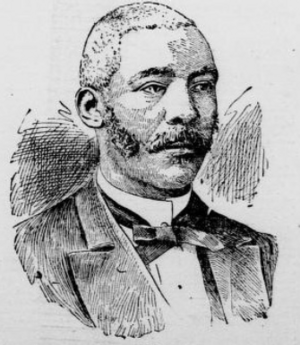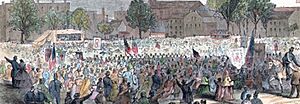Perry H. Carson facts for kids
Quick facts for kids
Perry H. Carson
|
|
|---|---|
 |
|
| Born | April 13, 1842 Princess Anne, Somerset County, Maryland
|
| Died | October 31, 1909 (aged 67) Washington, D.C.
|
Perry H. Carson (born April 13, 1842 – died October 31, 1909) was a very important African-American leader in Washington, D.C. during the late 1800s. People called him "Colonel Carson" and the "silver haired giant." He was known as the voice for working-class Black people in Washington. Perry spoke up for his community, acted on his beliefs, and represented Black residents at many Republican National Conventions.
Early Life and Beginnings
Perry H. Carson was born free in Princess Anne, Maryland, in 1842. When he was a teenager in Baltimore, he helped abolitionists. These were people who worked to end slavery. He helped them as they assisted enslaved people escaping to freedom.
After the American Civil War, Carson moved to Washington, D.C. He quickly became a leader in the city's African-American community. He worked for Mayor Sayles Bowen and as a trusted messenger for Alexander Robey Shepherd. This helped him meet important politicians in Washington.
Carson got most of his support from working-class Black people. He became very influential in politics. He was the president of the Blaine Invincible Republican Club. He also served for a long time as Washington D.C.'s representative to the Republican National Convention. People knew Carson as one of the main political leaders for Black Washingtonians. He was also easy to spot because he was over six feet tall and weighed about 235 pounds. With his silver hair, he was called the 'Tall Black Oak of the Potomac'.
Fighting for Rights
Perry Carson wanted to make a difference for Black people in Washington. He created a group called the "Boys in Blue." This was a group of local Black men. Their goal was to protect Black residents from others who saw them as a threat to their jobs. This group earned Perry Carson the name "Colonel." Many people supported his idea for this local Black group. About 1,500 Black men were ready to volunteer. Even students from Howard University offered to help.
Carson worked hard to demand equality for poor Black people. He also protested against Jim Crow laws. These laws separated people by race. While these laws started in Maryland, Carson believed they should not apply in Washington, D.C. One time, when he boarded a streetcar in D.C., the driver told him to go to the "colored" section. Carson argued that Jim Crow laws did not apply in D.C. Even though he went to the section, he was known as a strong leader. He often challenged politicians in his fight for a spot at the Republican National Conventions.
Political Leadership
Colonel Carson also started the Blaine Invincible Club. This club focused on the interests of the Black community and the Republican Party. It was the first Republican club in Washington. Carson became its president. He used his influence to become Washington D.C.'s representative to the Republican National Convention. He served as a delegate from 1880 to 1900.
During one selection for a delegate, a tribute to Perry Carson was sent to The Washington Post. The writer said that no other delegate had as much influence as Perry. He had attended many conventions. He was seen as "the most influential of his race." He was also called "a leader in every effort for the benefit and advancement of his people." Perry Carson was known for caring deeply about the city's success. He had strong support from the Black working class.
Carson's impact in Washington, D.C., is not always clear. He could not hold elected office that matched his political power. This was because people in D.C. could not vote for their own leaders. As a delegate, he earned praise, but he could not directly make laws. Carson was an important supporter for the Black community. He represented the people who needed help the most. Even though some people criticized his methods, his dedication to the less fortunate was clear by the time he died.
Carson faced challenges from other Black leaders, like William Calvin Chase. Chase believed Carson made things harder for Black people. Carson and Chase fought for political control of Washington's Black community for 30 years. They competed to represent D.C. at national conventions. They also disagreed on how to celebrate Emancipation Day. The Emancipation Day celebration grew bigger under Carson's leadership.
At 65, Carson faced pressure to leave his job in the D.C. government. The leaders wanted him to resign. Carson retired from politics when they asked him to take a pay cut. About a year and a half later, he got pneumonia and died in his home in D.C. When he passed away in 1909, even his rivals called him a "brave fighter."


